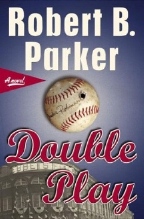Double Play
Robert B. Parker
G.P. Putnam's Sons
US Hardcover First
ISBN: 0-399-15188-5
288 Pages; $24.95
Publication Date: May 24, 2004
Date Reviewed: June 2, 2004
Reviewed by: Terry D'Auray © 2004

REFERENCES
COLUMNS
|
|
|
Double PlayRobert B. ParkerG.P. Putnam's SonsUS Hardcover FirstISBN: 0-399-15188-5288 Pages; $24.95Publication Date: May 24, 2004Date Reviewed: June 2, 2004Reviewed by: Terry D'Auray © 2004 |
|
|
REFERENCES |
COLUMNS |
In 'Double Play', Robert B. Parker pulls a watershed event from history, mixes it with fine-tuned fictional characters, and bathes both in evocative and detailed period atmosphere. The result is a novel where fact and fiction meet and meld into a seamless pas-de-deux that showcases each to optimum advantage.
Stepping away from his multiple mystery series characters, Parker writes a story about Joe Burke, a fictional bodyguard for Jackie Robinson, who, in 1947 begins his initial season as the first Negro to play major league baseball.* It's an historical event with a gravitas reaching well beyond the confines of the baseball diamond and Parker's story accords it all it deserves - reverence, respect, and accuracy. Part elegy to times past, part ode to the old-fashioned values of decency and duty, fairness and fearlessness, and all hardboiled mystery, 'Double Play' is a sure-fire winner.
'Double Play' is less a story about baseball than it is a story about the racial divides in America in the post-war 40s. Joe Burke, the bodyguard, is physically scarred and mentally battered from serving in battle during World War II. He is a deliberately emotionless white man making his way through the post-war world using the only skill he has yet to acquire, that as a wartime rifleman. Jackie Robinson, highly skilled and highly visible baseball player is personally scarred, most certainly, by the realities of living a black life in a white country. As history bears out, becoming the first Negro player in the Majors will lead to even more scars. Burke and Robinson bond, slowly, through shared experience and shared values. They discover they are more alike than different, more friends than enemies, and that each equally afraid of the darker elements shadowing their world.
Through-out 'Double Play', Parker intersperses the first-person recollections of young "Bobby", clearly the youthful Parker himself, who describes the excitement of wartime for those too young participate in actual fighting, and the details of daily life in the post-war 40s, all with authentic detail and touching sentiment. Bobby writes of his love of baseball and the Brooklyn Dodgers; of listening to Red Barber call games on the radio, sharing in the manly rites of summer with his father, along with a small sip of his father's beer; and, as a teenager, of sneaking off to Ebbet's Field, all by himself, to sit with the Negro fans to watch Jackie Robinson play baseball. Bobby's reminiscences add authentic dimension, nuance and a genuinely pure sweetness to the hardboiled story of Joe and Jackie. These chapter, too, offer some of the best nostalgic baseball writing around.
Parker brings his acclaimed bag of writing tricks - character, dialogue and plotting - to 'Double Play'. The Joe/Jackie story, written in the third person, is told mostly in dialogue. 'Double Play's' dialogue, while vintage Parker, is slightly quieter and cleanly stripped down. Much is left unsaid, but all is clearly understood. While Burke resembles Spenser, Parker's famous series detective, and while the developing camaraderie between Burke and Robinson harkens to that of Spenser and Hawk, the tone and tenor of these characters and their repartee is finessed, washed with sepia, to fit within the historical context. It's a subtle but masterful remix of the narrative skills for which Parker has become justly famous.
Vintage, too, is Parker's deft plotting and fine-tuned pacing. This story, stripped of all the baseball, still stands successfully on its own as a fully realized, first-rate mystery novel. Those who have no knowledge of baseball or no particular fondness for it will find this an engrossing, satisfying read. Parker didn't write a "baseball" book and he spends little time, outside the Bobby chapters, on the game itself. But he did chose to reprint actual box scores from some of those years' Dodgers games, with Bobby's admonition that "you can learn a lot from the box scores".
Parker's pulled off a very special triumph - a sensitive story of friendship, honor, decency, and love, mixed with hardboiled action and suspense, all leavened with nostalgia for an era bygone. Mystery reader, baseball fan, or both - all will have something to cheer about.